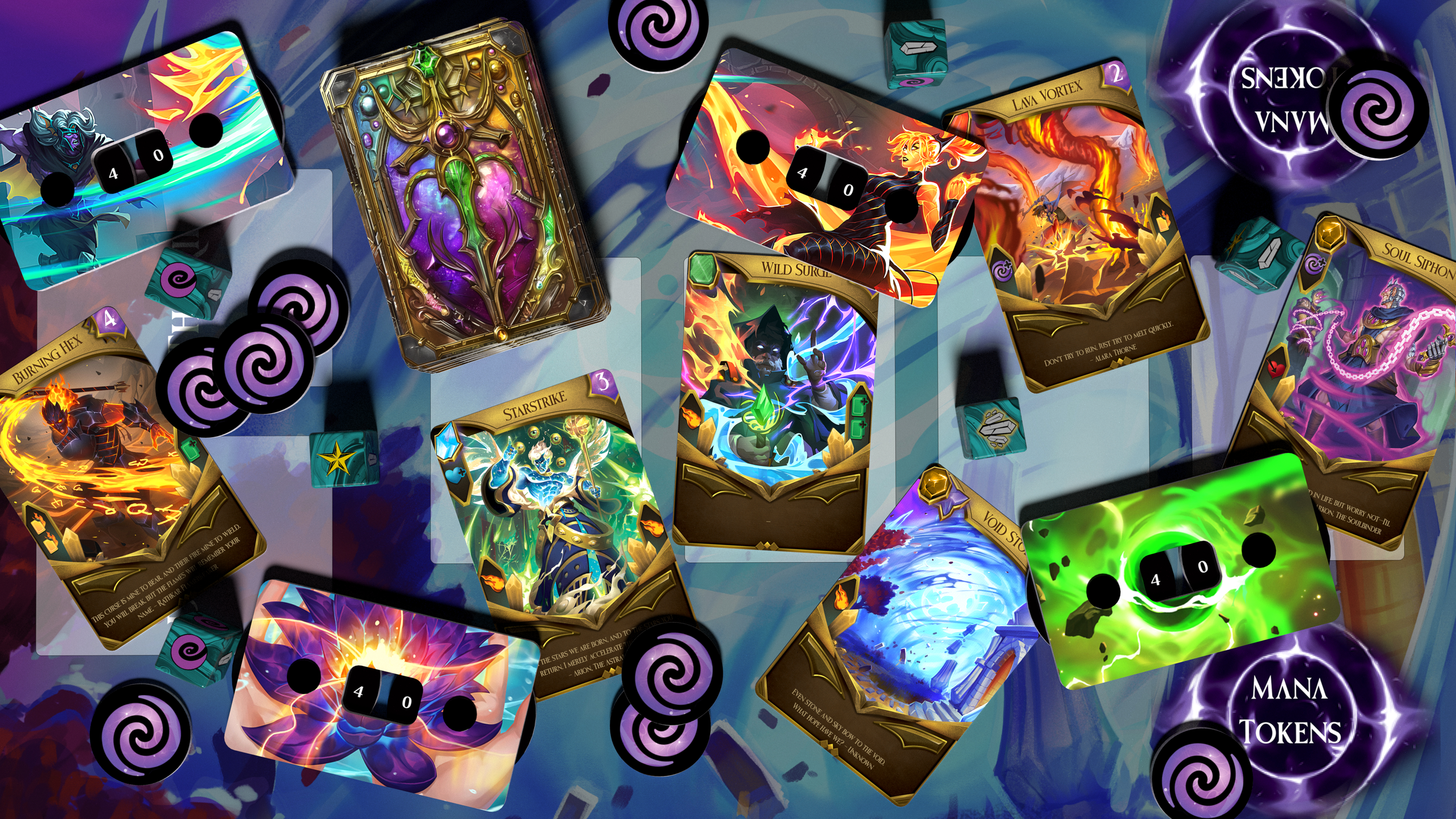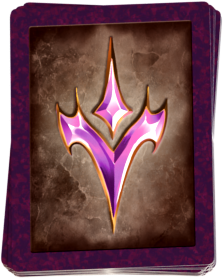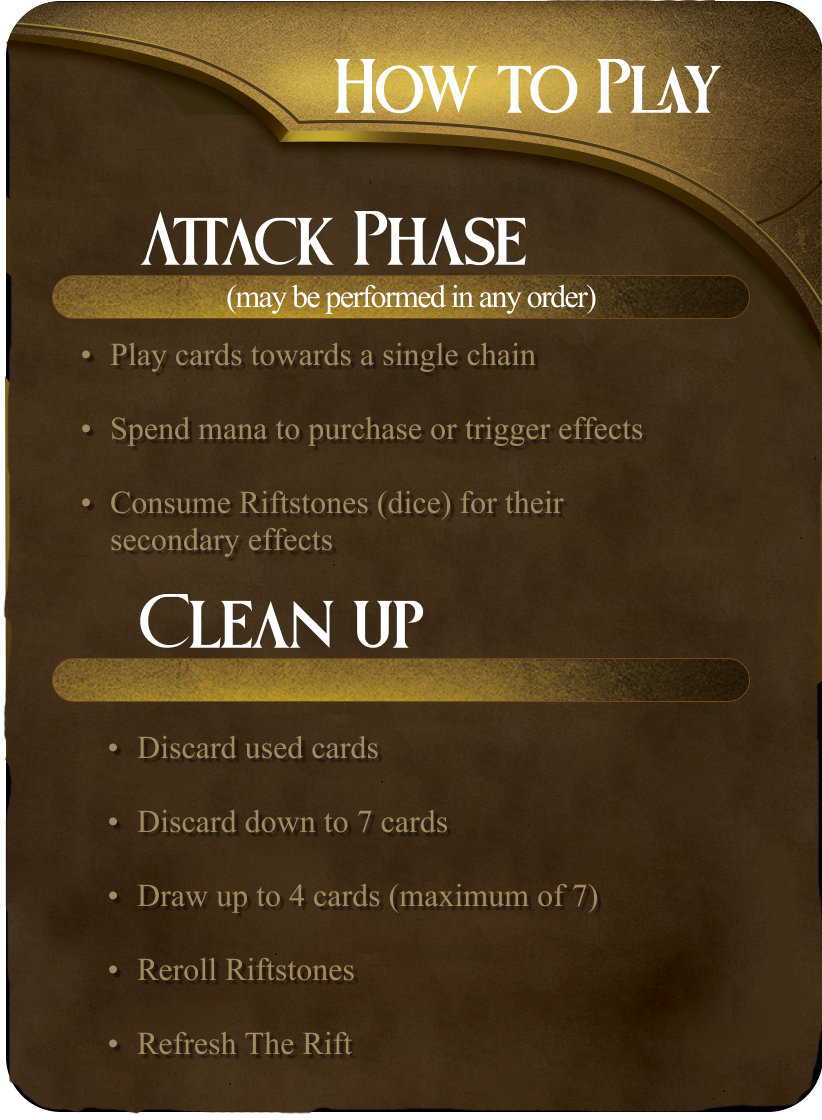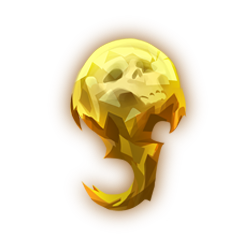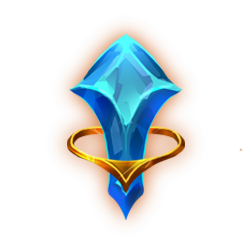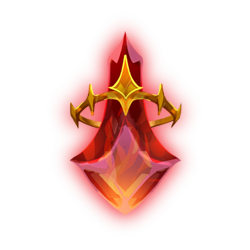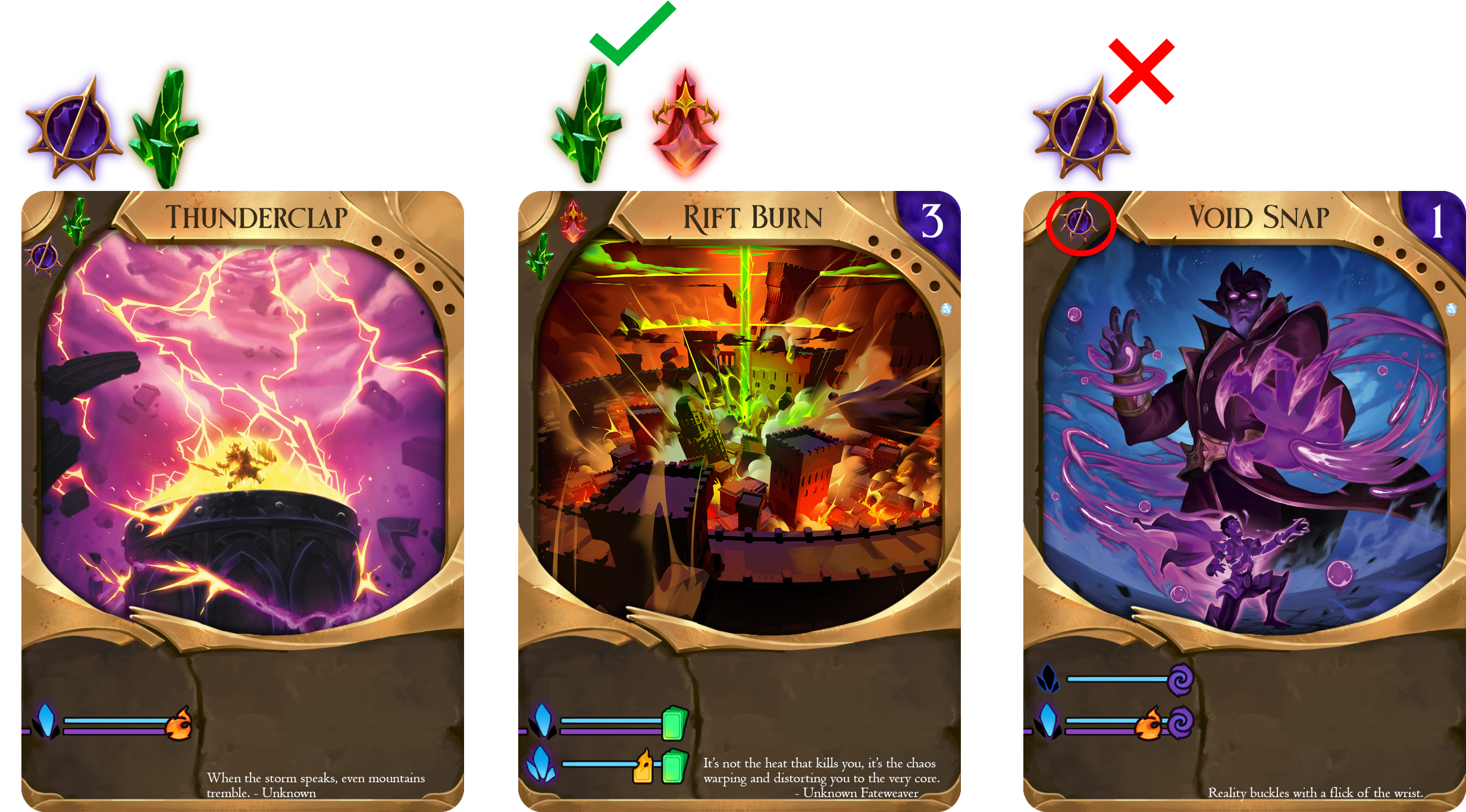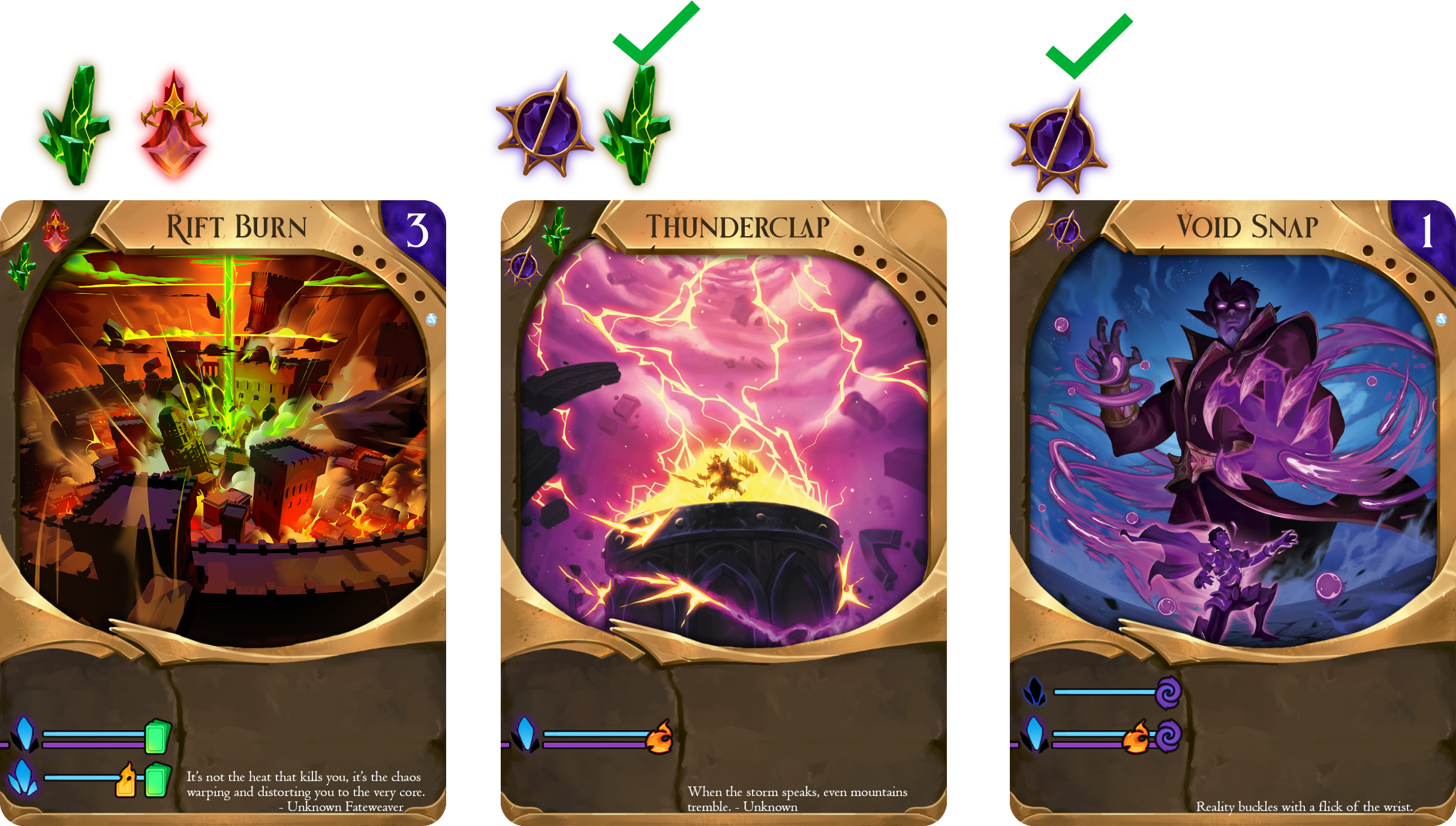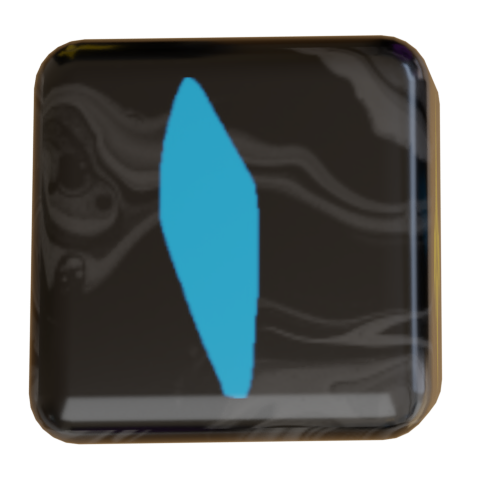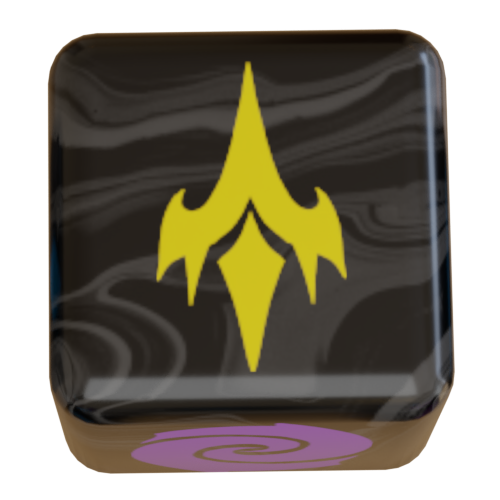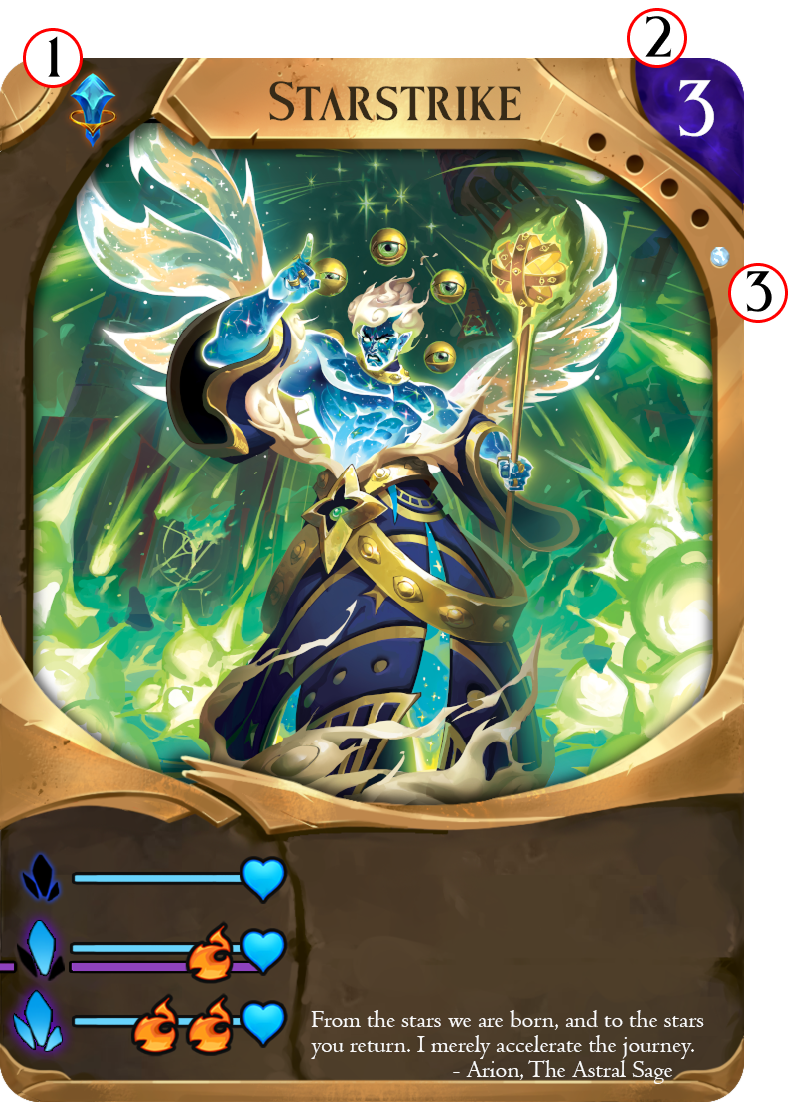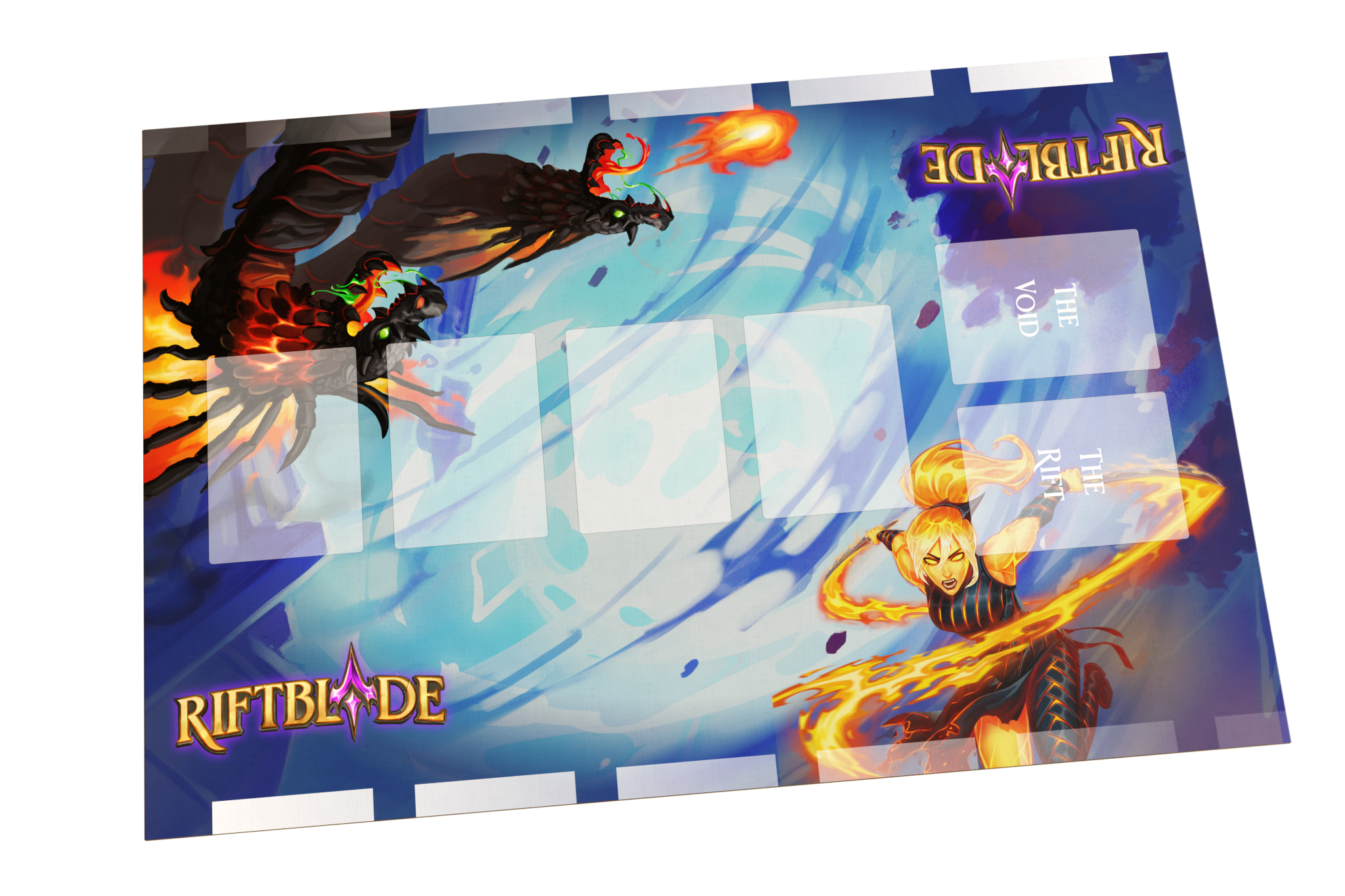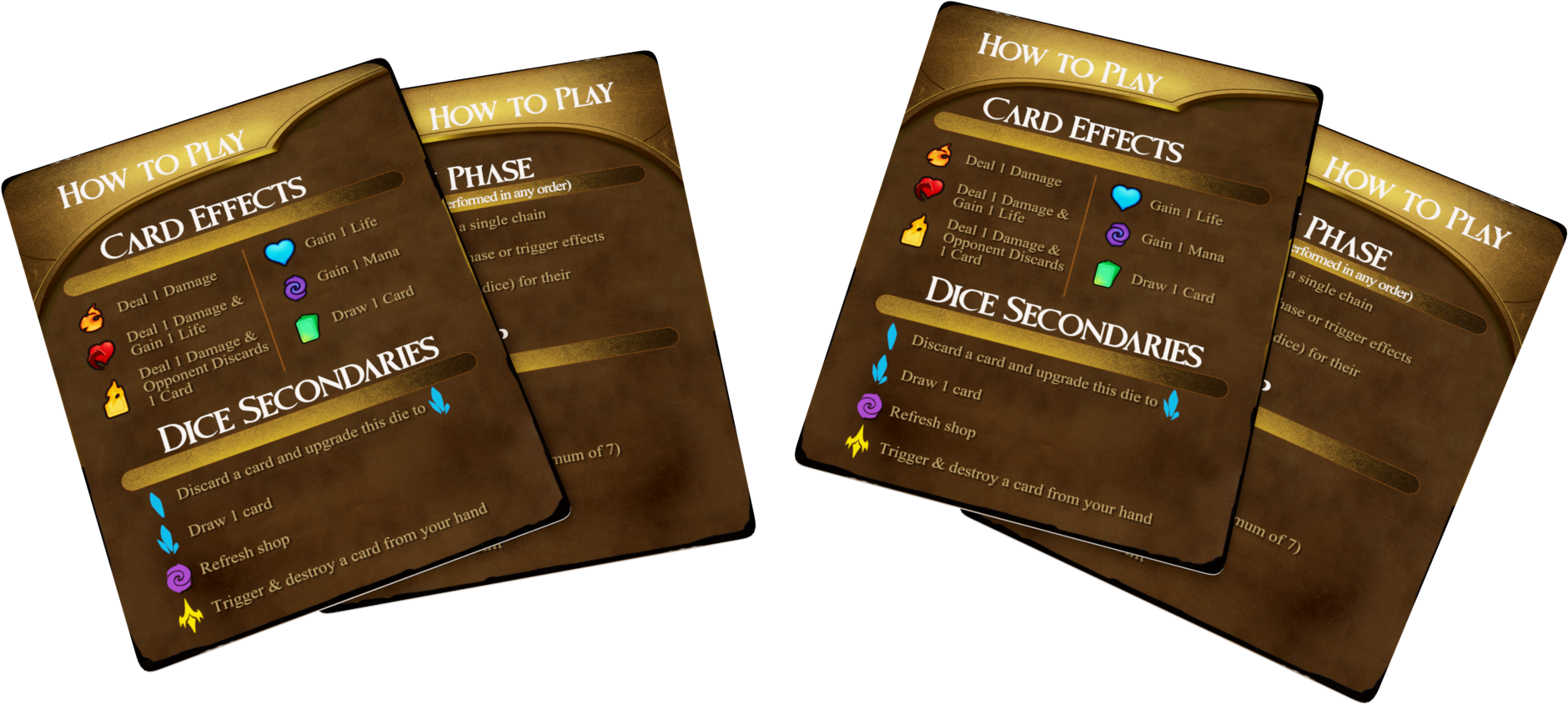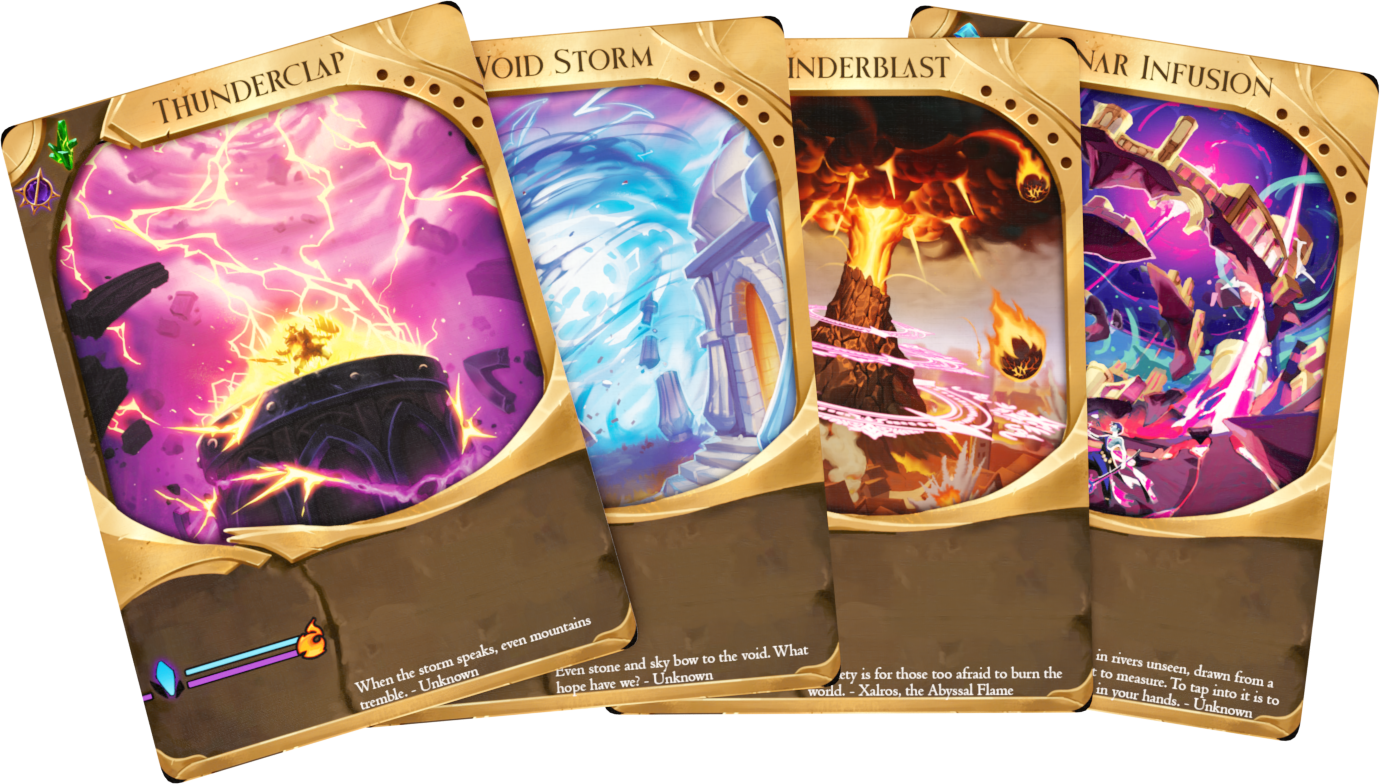HOW TO PLAY
Rules Version 0.21
Gameplay Overview
Step onto the battlefield as a powerful mage locked in a duel of wits in this exhilarating deck-builder that teaches quickly but plays deeply. Each turn, you will roll and manipulate your resources, then strategically craft your deck from The Rift, a shared pool of unique spell cards – or choose to cast and burn a spell, immediately benefiting from a fraction of its full potential. When you’re ready, chain together spells from your hand into a single, devastating attack to disorient, disarm, and destroy your opponent. Every decision matters, and you will need to balance short-term gains against long-term strategy. Do you have what it takes to outsmart your rival Riftblade and claim victory?
How to Play in 5 Steps
Players receive 2x of the following cards: Lunar Infusion, Cinderblast, Thunderclap, and Void Storm. Shuffle these together to form your starting deck and draw 4 cards.
Note: These cards have 0 mana cost.
Set Mana Tokens out where all players can access them.
Players take 4 Riftstones (dice) and roll these to create their starting resources.
Shuffle all remaining (nonstarter) cards together to form The Rift. Draw and display 4 into the center row.
Players set their life counters to 40 health.
Randomly select a player to go first. Alternatively, roll your Riftstones, rerolling ties. The player with the highest mana count goes first.
Anatomy of a Turn
Attack Phase
At the beginning of your turn, select another player as your target. That player receives 2 additional Riftstones (dice) and rolls them immediately.
Notes:
You must target a player, even if you deal zero damage during a turn.
In a two-player game, this means that the starting player will roll 4 Riftstones at the beginning of their first turn; both players will roll 6 Riftstones from that point on.
On your turn, you may perform any of the following actions in any order:
If you have not yet started a spell chain, play a card from your hand to begin one.
Add a card to your existing spell chain.
Activate your Riftstones for their secondary effects.
Purchase cards from The Rift using mana.
Trigger cards from The Rift using mana.
If at any point you need to draw a card and have none remaining in your deck, shuffle your discard pile and place it face-down to form a new draw deck.
At the end of your turn, draw 4 cards (up to a maximum of 7), reset any unused mana, and reroll your Riftstones. Play then proceeds clockwise.
Clean Up Phase
After you have finished performing actions during the Attack Phase, discard down to 7 cards, draw up to 4 cards (to a maximum of 7 cards in hand), forfeit any unused mana, and reroll your Riftstones. Refresh The Rift by drawing cards from the draw pile next to it until there is a face-up card in each of the 4 slots. Play then proceeds clockwise.
All games come with quick reference cards, so you’ll never need this page again. Unless you lose them…
Don’t do that.
End of Game
If your health reaches 0, you're out of the game. Play until only one player has health left -- that player is the winner!
Adding a Card to Your Combo
Soul
Void
Chaos
Each turn, you have the opportunity to cast a single spell chain, weaving cards from your hand together for maximum effect. In order to play a card, you must always be able to activate one set of effects from the card. This means cards with a Basic effect may be activated without Riftstones, but any card without basic effects will require a suitable Riftstone to play (Empowering, Overcharging, or Wild) to play. When playing a card, immediately select the Riftstone you will use to activate it, and gain the corresponding effect(s) on that card immediately.
Celestial
Infernal
Thunderclap’s Chaos Aspect chains into Rift Burn’s Chaos. However, neither of Rift Burn’s Aspects match with Void Snap’s Void Aspect.
However, if we flip the order of Riftburn and Thunderclap, then we can transition from Chaos/Infernal to Void/Chaos to Void Aspects, completing our chain.
Using Riftstone Secondaries
A Riftstone may be used for either their primary or secondary effect, but not both.
Mana Riftstone
Primary: Gain 1 Mana
Secondary: Discard all cards in The Rift and draw 4 new cards.
Empowering Riftstone
Primary: Empower a card
Secondary: Discard a card, upgrading this die to an Overcharging Riftstone
Overcharging Riftstone
Primary: Overcharge a card
Secondary: Draw 1 card
Wild Riftstone
Primary: Use as a Primary Effect of any other Riftstone
Secondary: Trigger a card from your hand
Purchasing Cards from The Rift
Each card in The Rift may be purchased for its mana cost and added to your discard pile. The Rift does not refresh until the end of the turn unless a Mana Riftstone is spent to refresh it. Mana gained from cards, or Wild Riftstones, may not be used to refresh The Rift.
Instead of purchasing a card, you may spend mana to activate the card’s Trigger Line as a one-time effect. If Triggering from The Rift, pay the mana cost, activate the effect(s), and immediately discard the card into The Void. When Triggering a card from your hand, you do not need to pay the mana cost again, simply activate the effect(s) and move the card into The Void.
Triggering Cards from The Rift and from Your Hand
Seraph’s Touch can be played for free or with an Overcharging Riftstone for maximum effect. Alternatively, Triggering Seraph’s Touch will activate the spell’s Basic Effect, healing the player for 1.
Soul Reave must have either an Empowering Riftstone or Overcharging Riftstone in order to be played. If triggered, Soul Reave’s Empowered effects will activate, dealing an opponent 1 damage, while healing the player for 1 as well.
Spell (Card) Anatomy
Aspect
Cards must contain at least one common Aspect with the previous card in your chain in order to be played. There are currently 5 Aspects in the game:
Void
Soul
Chaos
Infernal
Celestial
While Void connects to everything, each other element only has two or three connections — pay attention to maximize your synergy
Mana Cost
A card may be purchased or Triggered from The Rift by paying its Mana Cost. Starting cards have no mana cost associated with them and are easily identified by the lack of a mana background.
Rarity
A card’s rarity is a rough indication of how powerful it is compared to other cards of the same mana cost. Powerful is, of course, relative.
Common
4 / Set
Uncommon
2 / Set
Rare
1 / Set
Unique
Promo Only
Riftstone Activations
When playing a card, you must be able to activate at least one effect, usually by assigning a Riftstone. You may only activate a single set of effects on any given card.
Basic Effects may be activated without paying a Riftstone
Empowered Effects require an Empowering or Wild Riftstone to activate.
Overcharged Effects require an Overcharging or Wild Riftstone to activate.
Effects
Every time you activate a spell, you immediately gain its effects. The base game consists of six core effects:
Attack
Deal 1 Damage
Heal
Gain 1 Life
Mana
Gain 1 Mana
Draw
Draw 1 Card
Burn
Deal 1 Damage, Opponent Chooses & Discards a Card
Siphon
Deal 1 Damage, Gain 1 Life
Trigger Line
When a card is Triggered, activate this set of effects.
Alternate Game Modes
2v2
Are you tired of team games that feel like nothing but an afterthought? We are too. Playing in teams is an exciting mode where, instead of comboing with yourself, you create combos with the help of your partner. This requires only slight modifications to the rules above, but leads to a unique and complex game where only the best strategists will survive!
In this mode, players share a health dial, set to 40 life, but maintain their own dice pool of 4 dice each. Players no longer gain dice for being attacked.
Each turn, you and your teammate will choose which of you will go first; that player will begin the spell chain. That player’s partner will then play a card with a matching Aspect. Play goes back and forth until one player passes, at which point their teammate may continue playing cards. Mana may be spent to acquire or trigger cards in any order, at any point, by either player.
Have friends that want to play a tournament, but maybe you don’t have time to play several full length games in a sitting? No problem!
This mode is designed for 4 players and can be played in 2 games (Brackets) or 3 games (Round Robin). In both cases, randomly select your pairings for combat, and set your health dials to 30. The first game proceeds as normal, albeit with lower health. However, when you move into the next game, players retain their decks from the previous game, then they reset their health dials and face off against their next opponent.
This mode forces you to prioritize a quick start, while still planning a deck that scales well into the late game. Be careful: your traditional strategies might not work so well here!
Tournament Style - Brackets & Round Robin
FAQ
Are my cards played one at a time or all together?
Cards are played sequentially, allowing you to potentially benefit from the effects of the cards played earlier.
Do I discard my hand at the end of turn?
No, you only discard played cards.
How many dice can a player have in a turn?
In the base game, a player can have up to 10 dice on a turn during a 4 player free-for-all.
Can I heal over my starting life?
No.
In a 3 or 4-player free-for-all, can I spread my attacks across multiple opponents on a single turn?
No; at the beginning of your turn, you choose a single opponent to target; they gain and roll 2 Riftstones and will be subject to all card effects you play.
What are the Mana Tokens for?
They can be used to track mana earned from spell cards (as opposed to from Riftstones); many players find it helpful to see their total available mana at a glance. However, their use is optional. Reminder: only a Mana Riftstone (not even a Wild!) can be used to refresh The Rift.
Can I use an Overcharging Riftstone for a card with no overcharge effects?
Yes, you can Overcharge a card with only Empower effects.
Can Mana be carried over from turn to turn?
No.
Can I play a card with no effects to gain the Aspect benefits?
No
Why do you roll your Riftstones during Clean Up, instead of at the beginning of your turn?
For one thing, it helps you plan your upcoming turn as your opponent plays, speeding up the game. More importantly, seeing what your rivals are packing allows you to adapt your own plans for maximum disruption!
Can I “go back” and switch the Riftstones on already-played cards, or discard a card to turn an already-assigned Empower into an Overcharge, netting the more powerful effect on the assigned spell?
Officially, no – the decision of whether to Empower or Overcharge a card, and with which Riftstone, is made at the moment the card is played. However, for a more friendly game, or with newer players, this is the sort of thing that a more experienced player might consider allowing on a case-by-case basis. Note that this can be very disruptive to strategies around card draws and discards.
Components
Game Board
4 Health Dials
24 Riftstones
4 Sets of Quick Reference Cards
12 Mana Tokens
100 Rift Spells
32 Starting Spells

